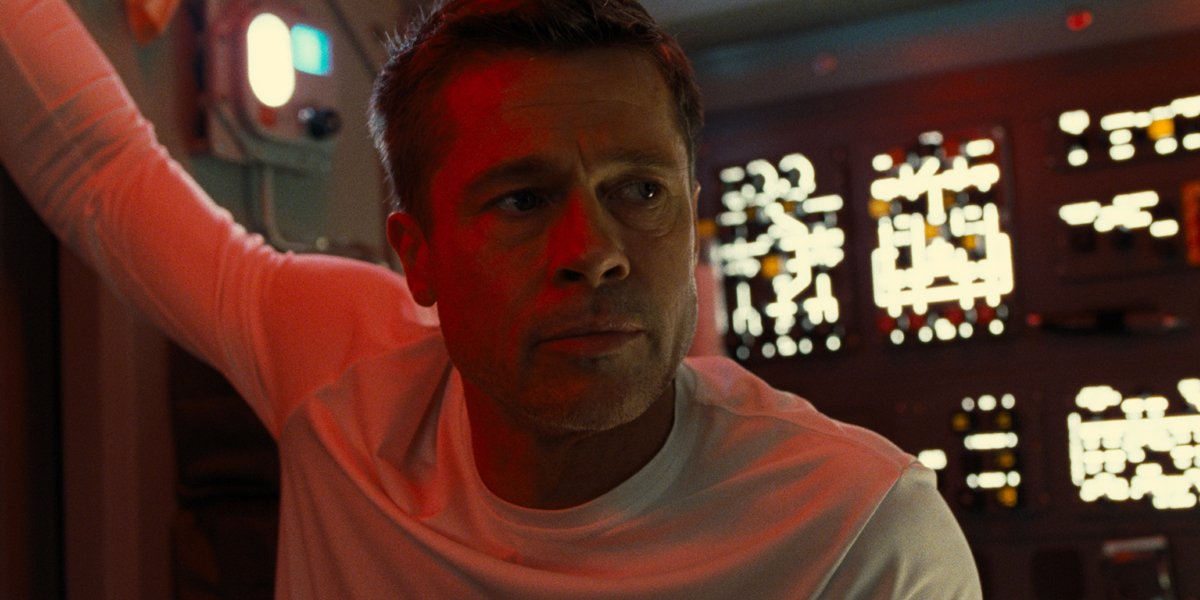With the genre completely dominated by big brands and franchises, large scale science-fiction that puts a greater focus on drama over action is rare in modern Hollywood – but that rarity makes each one feel notable. With a legacy that includes films like 2001: A Space Odyssey and Blade Runner, there is a particular draw to recent titles like The Martian, Gravity, Interstellar, and Arrival. They’re special because they are so clearly big swings for the fences, and trust that they can captivate an audience with universal questions and wonder.
Now James Gray’s Ad Astra has arrived to build on that remarkable and exclusive library/legacy, and it impressively stands tall in the limited crowd. Though very much its own original story, the film takes Joseph Conrad’s “Heart Of Darkness” into the cosmos and searches for the meaning of existence in the idea of what might exist beyond it – all while hanging on a spectacular performance-driven character study that moves from one harrowing set piece to the next on a solar system-spanning adventure.
The protagonist at the center of it all is decorated astronaut Roy McBride (Brad Pitt) who is living an ataraxic, disconnected existence in a not too distant future where mankind has begun to colonize outer space. He is well-regarded in his field, but ultimately most known for being the son of H. Clifford McBride (Tommy Lee Jones) – who famously led a mission to Neptune 30 years prior in the hopes of discovering intelligent life.
While Roy doesn’t remember much about his father, that significantly changes when a massive shockwave rips across the universe and causes serious power failures on Earth and beyond. Roy is told not only that his father is still alive, but that his mission from three decades ago, the Lima Project, is responsible for the dangerous pulse. With the threat still lingering, the stoic hero is asked to travel to Mars and try to send a message to his dad and stop catastrophic destruction.
It begins with a commercial flight to the hub on The Moon, decorated with all the trappings of a modern airport from Yoshinoya to Hudson News, but the further Roy travels the greater the danger increases. He slowly begins to question the legacy of H. Clifford McBride, while also discovering that there are certain aspects of the larger plan surrounding his mission that are being kept from him.
As Ad Astra’s sprawling narrative plays out, Roy has to make multiple stops along his journey – some planned, some not – and each one is designed as a fantastic set piece that introduces a new important element to the larger story. It allows the fantastic opportunity for James Gray to explore diverse sides of the larger sci-fi universe, and the results are consistently brilliant. While never losing the larger focus, this is a film that delivers a Mad Max-esque buggy assault by space pirates; what turns out to be a horrific rescue mission in a floating craft sending out a distress signal; and an untethered journey through an asteroid field. And all of it is brilliantly rendered with jaw-dropping visual effects, and bolstered by a fantastic rotating ensemble cast that includes fantastic actors like Ruth Negga and Donald Sutherland.
The movie clearly isn’t afraid to go big (particularly because it has the goods to support it), but its soul is Brad Pitt’s to carry, and he delivers what is one of the most breathtaking performances in his storied career. There is what seems like kind of a cheat that Ad Astra employs by repeatedly having Roy undergo psychological analysis to determine whether he is mentally fit enough to resume his assignment, but instead of approaching it as a booster seat Pitt transforms these scenes into fascinating and extraordinary, as what is interpreted by the automated system is clearly not the same as what is interpreted by the audience, and it’s stunning to see his gears turn faster and faster as the story continues and the situation starts to break him.
Given the established tone and atmosphere of the story, not to mention the exuded philosophy, there are particular issues to be had with the ending, as there exists a certain clash that doesn’t sit perfectly – but to explain it would obviously be giving too much away. At the same time, it’s very much a film that opens itself up to and invites subjective interpretation, and a rough landing doesn’t undercut the brilliance of the flight.
Ad Astra is the first venture into science-fiction for James Gray, but the writer/director demonstrates that he knows exactly what it is that makes the genre truly great, and makes phenomenal work of blending the infinity of the cosmos with eternal questions that possess no true answers. It’s a stunning work, and one of the best films of the year.

Eric Eisenberg is the Assistant Managing Editor at CinemaBlend. After graduating Boston University and earning a bachelor’s degree in journalism, he took a part-time job as a staff writer for CinemaBlend, and after six months was offered the opportunity to move to Los Angeles and take on a newly created West Coast Editor position. Over a decade later, he's continuing to advance his interests and expertise. In addition to conducting filmmaker interviews and contributing to the news and feature content of the site, Eric also oversees the Movie Reviews section, writes the the weekend box office report (published Sundays), and is the site's resident Stephen King expert. He has two King-related columns.











